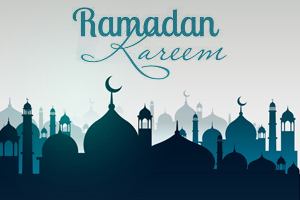 The world’s 1.6 billion Muslims, including 2.8 million in the UK, gear up for the start of Ramadan. The new moon is expected to be seen tonight, 26th May, which will be the official start of Ramadan. This means that tomorrow, 27th May will be the first day of fasting. This yearly event also signifies the time of dedication to prayer, self-purification and charity. The Eid al-Fitr, the last day of Ramadan is expected on 24th or 25th June, depending on the moon sighting.
The world’s 1.6 billion Muslims, including 2.8 million in the UK, gear up for the start of Ramadan. The new moon is expected to be seen tonight, 26th May, which will be the official start of Ramadan. This means that tomorrow, 27th May will be the first day of fasting. This yearly event also signifies the time of dedication to prayer, self-purification and charity. The Eid al-Fitr, the last day of Ramadan is expected on 24th or 25th June, depending on the moon sighting.
What is Ramadan?
Ramadan is considered the holiest month for the year. It is celebrated as the month Muhammad received the initial revelations of the Qur’an. The month is for strengthening faith in God, empathising with the less fortunate, as well improving one’s morality and character.
The most important aspect of Ramadan is fasting. It involves abstaining from all types of food and drinks, and having sex from sunrise to sunset. Muslims start their day by waking up before sunrise for morning prayer and breakfast. After their sunset prayer, most families break their fast with a communal Iftar meal. Three dates are traditionally but not mandatory eaten first to break the fast to emulate how Muhammad broke his fast.
Ramadan is the ninth month of the 12-month Islamic calendar based on the phases of the moon. Lunar months last 29 to 30 days, depending if the crescent moon is seen on the 29th of the month. If there is no sighting, the month lasts 30 days. The declaration of the start of Ramadan in Muslim-majority countries like Saudi Arabia rely on testimonies of local moon sighters. It is then decided by the Judicial High Court. Based on the Gregorian solar calendar, the lunar calendar is shorter by around 11 days. This results to different starting Ramadan dates, which over time passes through all the seasons. Last year, the first day of Ramadan fell on 6th June.
Importance of Fasting During Ramadan
O you who believe! Fasting is prescribed for you as it was prescribed for those before you, that you may attain Taqwa [God-consciousness]. – The Qur’an, Al-Baqarah:183
Fasting (sawm), is one of the five key pillars of the Islamic faith. The others are daily prayer (salat), charity (zakat), Hajj pilgrimage to Mecca, and declaration of faith (shahadah). Muslims believe it helps concentrate on devotion and worship, and also practice self-restraint and self-reflection. It also enables them to express gratitude, cleanse their soul and seek forgiveness. It is a way to empathasise with the hungry and less fortunate. This is why people donate to charities and feed the hungry during the Ramadan.
All Muslims who has reached puberty are required to fast. The sick and elderly, pregnant women and those who are nursing are exempted from fasting. However, they are expected to make up for their missed fast days in the future or help feed the less fortunate.
Essay Writer would like to wish our Muslim friends a Ramadan Mubarak!
 English
English 中文
中文
